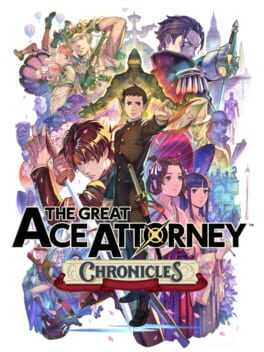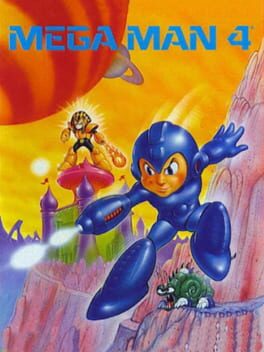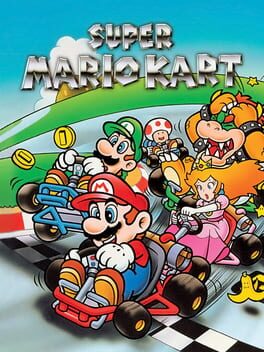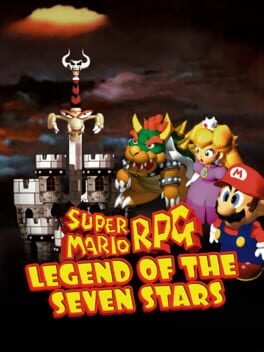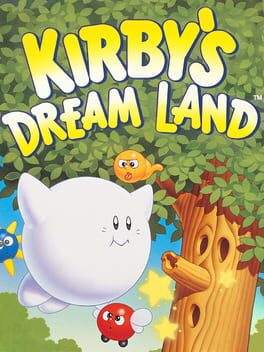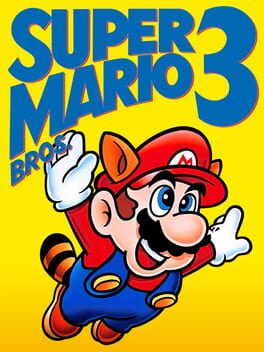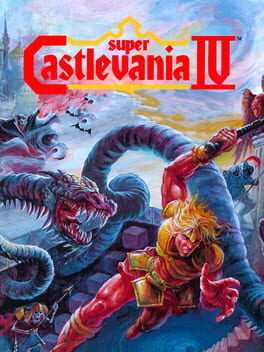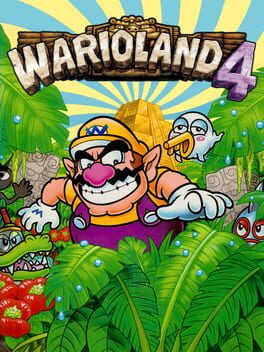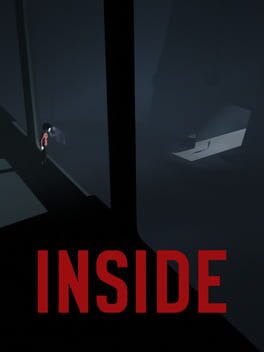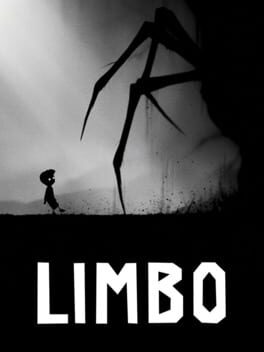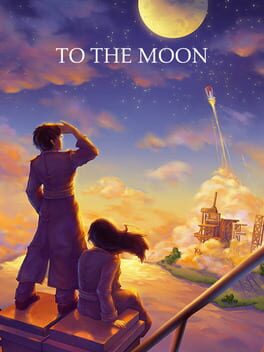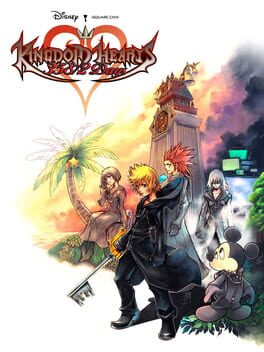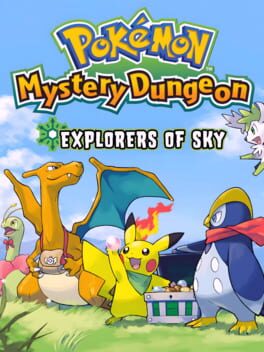Lickiwrath
I don't think I've played anything else that writes an unreliable narrator as well as this game does. The entire game does a truly commendable job at developing all its characters across different playthroughs, and compels you to ask deep questions about everyone's role in things as it casts suspicions equally across everyone.
That plot though... sure is something.
That plot though... sure is something.
I've been sitting on writing about this for over a week now, struggling to put my thoughts together cohesively, and honestly just dreading elaborating on what is, at the end of the day, a very short and sweet take on this duology, so I'll just say it and not care if I sound mean.
Adventures sucks. It takes until CASE 4 before you have a case with both a trial segment and an investigation segment, and even when you do get to the last two cases, it's only one chunk of each. Unprecedented, and while I guess I can appreciate a different approach, what it means is that the pacing drags for the whole game, not to mention inherently limits the stories of each case. Without multiple days for each case to build in complexity, the characters have to make the necessary revelations in a much more condensed time frame than any other Ace Attorney game has had to deal with, meaning that thing can't go as balls to the wall as its predecessors did, which, needless to say, is really disappointing. I haven't played Professor Layton vs. Phoenix Wright: Ace Attorney or... Dino Crisis... but those notwithstanding, this is the weakest game out of everything Shu Takumi's had significant contributions in.
Resolve is much more interesting. It often feels like it's trying a lot harder than the first game did to craft an interesting story. Thankfully the pacing is no longer an issue; every case after the intro has both a trial and an investigation, usually multiple of each. And in general the cases are a clear caliber above the first game, and a lot of the first game is recontextualized to make the story work.
But another issue rears its ugly head in this game: it's so AGONIZINGLY predictable! Every twist falls so flat and this game is never going to surprise you, making it a slog to get through, even though the cases are much more interesting this time around. This is almost worse than Adventures' pacing because all of Shu Takumi's works laugh in the face of predictability.
And most egregious of all, across both games, the characters suck. Ryunosuke is just Phoenix with less snark, no backstory, and the most generic character design I've ever seen. Susato is boring, and the takedown thing she does is obnoxious every time. I have never seen a duo with less chemistry than Ryunosuke and Kazuma, and the relationship they try and paint between these two is embarrassing. There is not a soul in either game who has as much life and personality as the parrot from the first Ace Attorney.
Resolve does a better job in this department. It doesn't have to do the heavy lifting of introducing the main cast, and its side characters are more entertaining. There's a decent selection of nutheads here, like Shamspeare, Harebrayne, Madam Tusspells, and the Redheads (side note I also really like the Eggert guy from the first game). But the best of these games can't come close to the original trilogy's cast in terms of zaniness, personality, or likability.
What's more disappointing is the main characters. The OG trilogy did such a good job of balancing its oddball ensemble with a main cast who were all very layered and developed. In The Great Ace Attorney Chronicles, the only character who has any development is Gina. I mean, Van Zieks learns how to not be racist I guess. But everyone else is alarmingly static. I don't dislike these characters, but it's so disappointing that there is not a single identifiable character arc for our MAIN CHARACTERS (that isn't Gina).
That's it. Adventures sucks because of its terrible pacing, Resolve is much better and is definitely a worthwhile time but suffers from predictability, and both games have an underwhelming group of characters. Rapid fire good stuff time:
- Both games work great in 3D. Not sure what DD or SoJ did well since I never played those but 3D looks good in these games at least
- The Summation Examinations and "Herlock Sholmes Deduction Spectaular" sequences are both the best parts of the games. Sholmes brings so much style that is always a blast
- More period pieces in video games that aren't Assassin's Creed, please
- The soundtrack is sadly lacking in classic Ace Attorney energeticness, but makes up for it by making the harpsichord SUPER sexy
- The scope of these two games, building an international conspiracy across TEN cases, is laudable, and in spite of the predictability of its "what," the "how" of the final case is extremely satisfying.
- That final breakdown, wow!
- The whole aesthetic is superb. The courtrooms feel so grand, the watercolor palette is exquisite in every area, I don't like Ryunosuke's basic design but every other character looks great, the game contrasts the look of Japan and Britain so well.
- I like the funny accents everyone talks in.
Adventures sucks. It takes until CASE 4 before you have a case with both a trial segment and an investigation segment, and even when you do get to the last two cases, it's only one chunk of each. Unprecedented, and while I guess I can appreciate a different approach, what it means is that the pacing drags for the whole game, not to mention inherently limits the stories of each case. Without multiple days for each case to build in complexity, the characters have to make the necessary revelations in a much more condensed time frame than any other Ace Attorney game has had to deal with, meaning that thing can't go as balls to the wall as its predecessors did, which, needless to say, is really disappointing. I haven't played Professor Layton vs. Phoenix Wright: Ace Attorney or... Dino Crisis... but those notwithstanding, this is the weakest game out of everything Shu Takumi's had significant contributions in.
Resolve is much more interesting. It often feels like it's trying a lot harder than the first game did to craft an interesting story. Thankfully the pacing is no longer an issue; every case after the intro has both a trial and an investigation, usually multiple of each. And in general the cases are a clear caliber above the first game, and a lot of the first game is recontextualized to make the story work.
But another issue rears its ugly head in this game: it's so AGONIZINGLY predictable! Every twist falls so flat and this game is never going to surprise you, making it a slog to get through, even though the cases are much more interesting this time around. This is almost worse than Adventures' pacing because all of Shu Takumi's works laugh in the face of predictability.
And most egregious of all, across both games, the characters suck. Ryunosuke is just Phoenix with less snark, no backstory, and the most generic character design I've ever seen. Susato is boring, and the takedown thing she does is obnoxious every time. I have never seen a duo with less chemistry than Ryunosuke and Kazuma, and the relationship they try and paint between these two is embarrassing. There is not a soul in either game who has as much life and personality as the parrot from the first Ace Attorney.
Resolve does a better job in this department. It doesn't have to do the heavy lifting of introducing the main cast, and its side characters are more entertaining. There's a decent selection of nutheads here, like Shamspeare, Harebrayne, Madam Tusspells, and the Redheads (side note I also really like the Eggert guy from the first game). But the best of these games can't come close to the original trilogy's cast in terms of zaniness, personality, or likability.
What's more disappointing is the main characters. The OG trilogy did such a good job of balancing its oddball ensemble with a main cast who were all very layered and developed. In The Great Ace Attorney Chronicles, the only character who has any development is Gina. I mean, Van Zieks learns how to not be racist I guess. But everyone else is alarmingly static. I don't dislike these characters, but it's so disappointing that there is not a single identifiable character arc for our MAIN CHARACTERS (that isn't Gina).
That's it. Adventures sucks because of its terrible pacing, Resolve is much better and is definitely a worthwhile time but suffers from predictability, and both games have an underwhelming group of characters. Rapid fire good stuff time:
- Both games work great in 3D. Not sure what DD or SoJ did well since I never played those but 3D looks good in these games at least
- The Summation Examinations and "Herlock Sholmes Deduction Spectaular" sequences are both the best parts of the games. Sholmes brings so much style that is always a blast
- More period pieces in video games that aren't Assassin's Creed, please
- The soundtrack is sadly lacking in classic Ace Attorney energeticness, but makes up for it by making the harpsichord SUPER sexy
- The scope of these two games, building an international conspiracy across TEN cases, is laudable, and in spite of the predictability of its "what," the "how" of the final case is extremely satisfying.
- That final breakdown, wow!
- The whole aesthetic is superb. The courtrooms feel so grand, the watercolor palette is exquisite in every area, I don't like Ryunosuke's basic design but every other character looks great, the game contrasts the look of Japan and Britain so well.
- I like the funny accents everyone talks in.
1991
It has been YEARS since I've played a Mega Man game. I'd heard mixed things about this particular one, but I was excited to jump back in after a long hiatus. But my excitement soon turned into nervousness when I started playing, because someone on the level design team LOVED spikes, and especially enemies coming from off-screen and knocking you into bottomless pits. It was aggravating, but, the stages got progressively easier the more weapons I unlocked (I guess that's how it goes in Mega Man, use your powers to ignore all the bullshit), so I found myself having more fun the more I pushed through. Drill Man's stage can suck it though.
Questionable design aside, there's a lot I enjoyed about Mega Man IV. The most obvious thing is the huge presentation boost. Not just the opening cutscene and the new weapon acquisition animation, but also the level themes. The coolest thing about the first Mega Man is how its level design really played into its themes; Cut Man's stage really felt like infiltrating this towering fortress, Guts Man's stage felt like descending down a huge construction shaft. MMII and III had way more visually creative themes, which was certainly for the better, but lost some of that... grounded adventurousness for lack of a better term. MMIV incorporates that same feeling, but with the way more interesting aesthetics of II and III, making for what is easily the best looking game thus far, and by a much more substantial margin than you'd expect.
I also like this game's (slight) emphasis on exploration. It's really not all that special (and from what I know the rest of the classic series and especially the X series do this way more), but it's cool to occasionally stumble upon a different path and be rewarded with the balloon and wire (which are both awesome, btw).
And the core gameplay feels just as good as ever. Mega Man's still got the slide, he has the charge shot finally, Rush still rocks, Eddie's always a welcome surprise whenever he shows up, and I think the weapons are... ok. I like how the Pharaoh Shot essential gets two fully charged shots per use by hitting an enemy while charging and then throwing it; Rain Flush and Flash Stopper are great for when you don't wanna deal with things, and I like how the level design makes you use these two like you would Rush or the items, navigating around enemies rather than strictly being combat weapons. I like the Dust Crusher and the Drill Bomb as alternatives that aren't just a worse version of the Mega Buster (although I usually just used the charge shot). The Ring Boomerang sucks, I don't think I ever used the Dive Missile for anything that wasn't a boss, and the Skull Barrier is great for letting me ignore everything in Drill Man's stage, but I rarely used it outside of that. Nothing here replaces the Mega Buster for me, nor is anything as fun and broken as the Thunder Beam or the Metal Blade, but I also don't feel like most of them are worthless imitators of my basic attack like most of MMIII's arsenal.
The soundtrack I also think is... ok. It's head-boppy enough while I'm playing, but there's nothing here'd I'd go out of my way to listen to sadly. BUT there's also nothing I actively dislike, which I think is a first for a classic Mega Man.
Yea, I guess this game being just... ok... could summarize my whole opinion on it, and I guess in that sense I don't really disagree with the consensus on this entry. And as future classic games continue to iteratively improve on the formula, maybe I won't think of this as fondly. But, frustrating as it was at times, I did have a lot of fun with this one! I wouldn't shrug it off as a worthless entry in the series, and I think it at the very least is better than both I and III.
Questionable design aside, there's a lot I enjoyed about Mega Man IV. The most obvious thing is the huge presentation boost. Not just the opening cutscene and the new weapon acquisition animation, but also the level themes. The coolest thing about the first Mega Man is how its level design really played into its themes; Cut Man's stage really felt like infiltrating this towering fortress, Guts Man's stage felt like descending down a huge construction shaft. MMII and III had way more visually creative themes, which was certainly for the better, but lost some of that... grounded adventurousness for lack of a better term. MMIV incorporates that same feeling, but with the way more interesting aesthetics of II and III, making for what is easily the best looking game thus far, and by a much more substantial margin than you'd expect.
I also like this game's (slight) emphasis on exploration. It's really not all that special (and from what I know the rest of the classic series and especially the X series do this way more), but it's cool to occasionally stumble upon a different path and be rewarded with the balloon and wire (which are both awesome, btw).
And the core gameplay feels just as good as ever. Mega Man's still got the slide, he has the charge shot finally, Rush still rocks, Eddie's always a welcome surprise whenever he shows up, and I think the weapons are... ok. I like how the Pharaoh Shot essential gets two fully charged shots per use by hitting an enemy while charging and then throwing it; Rain Flush and Flash Stopper are great for when you don't wanna deal with things, and I like how the level design makes you use these two like you would Rush or the items, navigating around enemies rather than strictly being combat weapons. I like the Dust Crusher and the Drill Bomb as alternatives that aren't just a worse version of the Mega Buster (although I usually just used the charge shot). The Ring Boomerang sucks, I don't think I ever used the Dive Missile for anything that wasn't a boss, and the Skull Barrier is great for letting me ignore everything in Drill Man's stage, but I rarely used it outside of that. Nothing here replaces the Mega Buster for me, nor is anything as fun and broken as the Thunder Beam or the Metal Blade, but I also don't feel like most of them are worthless imitators of my basic attack like most of MMIII's arsenal.
The soundtrack I also think is... ok. It's head-boppy enough while I'm playing, but there's nothing here'd I'd go out of my way to listen to sadly. BUT there's also nothing I actively dislike, which I think is a first for a classic Mega Man.
Yea, I guess this game being just... ok... could summarize my whole opinion on it, and I guess in that sense I don't really disagree with the consensus on this entry. And as future classic games continue to iteratively improve on the formula, maybe I won't think of this as fondly. But, frustrating as it was at times, I did have a lot of fun with this one! I wouldn't shrug it off as a worthless entry in the series, and I think it at the very least is better than both I and III.
1992
Ok, does anyone else feel like Mario is ASS in this game? I don't know what it is, but basically from the midpoint until the end of the game when I started grinding and getting the best equipment from side quests, I found that Mario would hit with all the force of a pool noodle, he'd die in like two hits, and I swear every significant enemy in the game resists fire. Until you get the lazy shell, he's easily the worst party member in the game, it sucks that you can't switch him out.
Anyway yea, didn't really have the best time with this one. I don't think it's a particularly hard RPG all things considered, but I feel like it just wants to kick you in the balls and be generally annoying with some wack stat distribution and some obnoxious bosses that walled many of my attacks. I chilled with Bowser and Mallow through most of the game, and I feel like that was for the best given that, until the end game, Bowser is easily the best damage dealer, and Mallow's screen nukes just straight up hit harder until I could grind Geno high enough to get his late game spells and his Magical Attack up worth a damn. I think it's a fine enough time, and I like the timed hits as usual (I think this was the first RPG to ever do something like it, so that's cool, if true), but I was irked more than impressed by a lot of it.
Visually, yea it's definitely dated. I used to think this game was really ugly, and I certainly wouldn't blame anyone for still thinking so with its 3D assets that don't always have proper shading and thus clash with the lighting, the big blue void that everything floats over, and the bright obnoxious colors that stab you in the eyes. But now, I find the graphics charming, and the sprite animation and enemy designs are just straight up really good. It's definitely not as expressive as the Mario & Luigi games, nor does it have as defined a style as Paper Mario, but the puppet-esque look and all the pantomiming done by the characters make the comedy work as well as it does (and makes me worried for the remake).
Sadly, musically I think it's just ok, which is the most disappointing part. Yoko Shimomura is my favorite composer, and I don't get it because it's not like she hadn't found her groove yet, she'd already done great work with Street Fighter II. But something about the Mario RPGs she worked on just don't click with me. That said, I like this more than Superstar Saga's soundtrack, I like the town themes like Rose Town, Hello Happy Kingdom, Hard Working Moles are Good Moles, and Nimbus Land, but I think the ost is lacking in good dungeon and battle themes (with the exception of Margarie Margarita, which no one talks about, and, obviously, Beware the Forest's Mushrooms, which is the best track in the game).
I think it would be hysterical if in the next Smash Bros. game, they announced that Mallow would be joining the roster instead of Geno.
Anyway yea, didn't really have the best time with this one. I don't think it's a particularly hard RPG all things considered, but I feel like it just wants to kick you in the balls and be generally annoying with some wack stat distribution and some obnoxious bosses that walled many of my attacks. I chilled with Bowser and Mallow through most of the game, and I feel like that was for the best given that, until the end game, Bowser is easily the best damage dealer, and Mallow's screen nukes just straight up hit harder until I could grind Geno high enough to get his late game spells and his Magical Attack up worth a damn. I think it's a fine enough time, and I like the timed hits as usual (I think this was the first RPG to ever do something like it, so that's cool, if true), but I was irked more than impressed by a lot of it.
Visually, yea it's definitely dated. I used to think this game was really ugly, and I certainly wouldn't blame anyone for still thinking so with its 3D assets that don't always have proper shading and thus clash with the lighting, the big blue void that everything floats over, and the bright obnoxious colors that stab you in the eyes. But now, I find the graphics charming, and the sprite animation and enemy designs are just straight up really good. It's definitely not as expressive as the Mario & Luigi games, nor does it have as defined a style as Paper Mario, but the puppet-esque look and all the pantomiming done by the characters make the comedy work as well as it does (and makes me worried for the remake).
Sadly, musically I think it's just ok, which is the most disappointing part. Yoko Shimomura is my favorite composer, and I don't get it because it's not like she hadn't found her groove yet, she'd already done great work with Street Fighter II. But something about the Mario RPGs she worked on just don't click with me. That said, I like this more than Superstar Saga's soundtrack, I like the town themes like Rose Town, Hello Happy Kingdom, Hard Working Moles are Good Moles, and Nimbus Land, but I think the ost is lacking in good dungeon and battle themes (with the exception of Margarie Margarita, which no one talks about, and, obviously, Beware the Forest's Mushrooms, which is the best track in the game).
I think it would be hysterical if in the next Smash Bros. game, they announced that Mallow would be joining the roster instead of Geno.
1992
1988
1991
To paraphrase a certain mule: there are two types of hard games: "tough but fair," and "tough but fuck you." Super Castlevania IV manages to be "tough but fun anyway."
It is filled to the brim with undeniable bullshit: platforms that flip over or straight up break when you land on them, knockback into bottomless pits, bosses stunlocking you, instakill spikes, enemies being obscured by the hud and hitting you from above, instances where it's impossible to avoid taking damage, getting stuck on stairs, falling through stairs, the game starving you for sub weapons and meat, those asshole skeletons that jump and throw bones like axes. It is rage-enducingly hard, I put the controller down many times out of frustration, and you can bet your ass I save scummed through the whole thing. And given this game's reputation as "the easy one" in comparison to its predecessors, I don't ever want to play the NES games.
But damn does this game give you such a sense of accomplishment for beating each of its stages. The core platforming, whipping, ghoul-slaying action feels so inherently good, the controls are precise (if a bit stiff), the game's gorgeous and spooky aesthetic and vibey soundtrack are so inviting, and with each death I found myself getting better. This game is constantly taunting you each stage, only to encourage you in equal measure to give it one more go. If you're determined enough, it's more than doable, and it certainly gets my recommendation.
It is filled to the brim with undeniable bullshit: platforms that flip over or straight up break when you land on them, knockback into bottomless pits, bosses stunlocking you, instakill spikes, enemies being obscured by the hud and hitting you from above, instances where it's impossible to avoid taking damage, getting stuck on stairs, falling through stairs, the game starving you for sub weapons and meat, those asshole skeletons that jump and throw bones like axes. It is rage-enducingly hard, I put the controller down many times out of frustration, and you can bet your ass I save scummed through the whole thing. And given this game's reputation as "the easy one" in comparison to its predecessors, I don't ever want to play the NES games.
But damn does this game give you such a sense of accomplishment for beating each of its stages. The core platforming, whipping, ghoul-slaying action feels so inherently good, the controls are precise (if a bit stiff), the game's gorgeous and spooky aesthetic and vibey soundtrack are so inviting, and with each death I found myself getting better. This game is constantly taunting you each stage, only to encourage you in equal measure to give it one more go. If you're determined enough, it's more than doable, and it certainly gets my recommendation.
2001
2016
2010
Nothing but respect for this. It asks for so little from you in price, length, and skill that it's such an accessible game, while at the same time being challenging enough to be a memorable and engaging puzzle platformer, and wearing its artistry proudly and non-obnoxiously for those who look for and want to understand that artistry in video games.
For me, it's just a tad bit too abstract and speculative for my liking. I enjoy reading about people's thoughts on it, but I would've liked a few more breadcrumbs to understand either the Limbo itself or this boy if I were to be more invested in its plot and themes. But then again, its abstract nature is entirely the point, and the game's best elements work because of that abstractness.
What I did really like, and what I think holds me back from liking it more, is how great of a horror game this is, and how that element falls to the wayside as it goes on. I love how Limbo starts in a forest, its presentation so quiet and focused on its black-and-white, staticy, barely out of focus aesthetic. It's immediately engaging and intriguing in a way that so few games are. And as I began to move forward, so many questions arose in my mind. Not just questions of "who is this kid?" and "what is this place?" No, questions with deeper, more sinister implications. Questions like "why do I keep going forward?" "Well, there's nowhere else to go, I guess..." "These are... bear traps! Why are they here, and... wait... someone must have set them here. I'm not alone. But who? And are they hostile? Or are they just as scared of me as I am of them?"
Damn, that first hour is really spectacular. Everything with the spider and with the booby traps, and with these strangers with unclear motives, everything about it induces this primal fear. You are unsafe and alone in an unfeeling world, and all you can do is keep running, and use your wits to survive as best you can, because better they die than you.
Once the setting changes to become more industrial is when the game begins to lose me a bit. There are still dangers aplenty, notable set pieces, challenging puzzles, and some really cool uses of total darkness, but that primal fear becomes lost. I think the game is striving to explore fear in more evolved capacities, but the lifelessness of this manmade world is far less compelling and scary to me than what the game started with, and that's what holds me back from fully loving this.
But despite that, still so so good, and easily worth the handful of hours it takes to complete.
For me, it's just a tad bit too abstract and speculative for my liking. I enjoy reading about people's thoughts on it, but I would've liked a few more breadcrumbs to understand either the Limbo itself or this boy if I were to be more invested in its plot and themes. But then again, its abstract nature is entirely the point, and the game's best elements work because of that abstractness.
What I did really like, and what I think holds me back from liking it more, is how great of a horror game this is, and how that element falls to the wayside as it goes on. I love how Limbo starts in a forest, its presentation so quiet and focused on its black-and-white, staticy, barely out of focus aesthetic. It's immediately engaging and intriguing in a way that so few games are. And as I began to move forward, so many questions arose in my mind. Not just questions of "who is this kid?" and "what is this place?" No, questions with deeper, more sinister implications. Questions like "why do I keep going forward?" "Well, there's nowhere else to go, I guess..." "These are... bear traps! Why are they here, and... wait... someone must have set them here. I'm not alone. But who? And are they hostile? Or are they just as scared of me as I am of them?"
Damn, that first hour is really spectacular. Everything with the spider and with the booby traps, and with these strangers with unclear motives, everything about it induces this primal fear. You are unsafe and alone in an unfeeling world, and all you can do is keep running, and use your wits to survive as best you can, because better they die than you.
Once the setting changes to become more industrial is when the game begins to lose me a bit. There are still dangers aplenty, notable set pieces, challenging puzzles, and some really cool uses of total darkness, but that primal fear becomes lost. I think the game is striving to explore fear in more evolved capacities, but the lifelessness of this manmade world is far less compelling and scary to me than what the game started with, and that's what holds me back from fully loving this.
But despite that, still so so good, and easily worth the handful of hours it takes to complete.
2011
This seems like a pretty split game; most people are either in the camp that it's fantastic and an example of some of the most emotionally investing writing in the medium, some think it's really boring and un-noteworthy. Me, I think it's just ok. It nails the aesthetic that it's going for, even if the UI looks like the steam re-releases of Final Fantasy games, and the score is really good. Other than that, ehhhh, A for effort I guess.
The first act draaaags; the gameplay is really tedious, which is fine inherently, but it's before the story picks up enough to justify it. The second act starts getting better, and tbh I wish there was more time spent outside of John's memories. The third act starts getting crazy, and I kinda love it. The whole zombie part makes no sense at all, but I'm here for it, and it was a missed opportunity for the game to play more with Eva and Neil's abilities to mess with each other through John's memories.
I think what ultimately makes me not care about this game is that it starts presenting interesting decisions about what to do with John's fate once they reach the beginning of his memory, but doesn't do enough with it. Which is a shame, Eva and Neil's personalities are both so bold and diametrically opposed that the little we do get is super interesting, but it's short lived and kinda throws it all away for a happy ending that I just couldn't stay invested in.
The first act draaaags; the gameplay is really tedious, which is fine inherently, but it's before the story picks up enough to justify it. The second act starts getting better, and tbh I wish there was more time spent outside of John's memories. The third act starts getting crazy, and I kinda love it. The whole zombie part makes no sense at all, but I'm here for it, and it was a missed opportunity for the game to play more with Eva and Neil's abilities to mess with each other through John's memories.
I think what ultimately makes me not care about this game is that it starts presenting interesting decisions about what to do with John's fate once they reach the beginning of his memory, but doesn't do enough with it. Which is a shame, Eva and Neil's personalities are both so bold and diametrically opposed that the little we do get is super interesting, but it's short lived and kinda throws it all away for a happy ending that I just couldn't stay invested in.
2021
I don't wanna hear it from anyone. This game showcases Nomura's talent at writing characters.
Such a sincere and relatable story about loneliness and purpose. Roxas is one of the greatest video game characters ever made. The entire game does an incredible job of pacing the development of his character and his relationships with the rest of the organization members. I used to be disappointed that this game didn't explore the rest of the organization more, but now I think it's intentionally brilliant how little we really know about them, because these people don't matter to Roxas. Axel, Xion, Saïx, and the collective entity of the organization are the only ones that are significant to his life, so it makes sense that those are the only ones explored. And the buildup and conclusion is stellar. I love reading Roxas' diary throughout the game, and his blowup at Axel is perfect, leading to not only an insane boss rush, but also to some of the most effective storytelling not only in the series but in the entire medium of video games.
Such a sincere and relatable story about loneliness and purpose. Roxas is one of the greatest video game characters ever made. The entire game does an incredible job of pacing the development of his character and his relationships with the rest of the organization members. I used to be disappointed that this game didn't explore the rest of the organization more, but now I think it's intentionally brilliant how little we really know about them, because these people don't matter to Roxas. Axel, Xion, Saïx, and the collective entity of the organization are the only ones that are significant to his life, so it makes sense that those are the only ones explored. And the buildup and conclusion is stellar. I love reading Roxas' diary throughout the game, and his blowup at Axel is perfect, leading to not only an insane boss rush, but also to some of the most effective storytelling not only in the series but in the entire medium of video games.
Bold of Nintendo to release a game about toxic work environments
A childhood classic of mine, as I'm sure it is with many people. I'm honestly kind of surprised by its cult status 15 years after its release, but also happy that a game I grew up loving is so heavily revered and has the respect it rightfully deserved as its own work and as a unique spin-off.
But I'd be lying if I said I wasn't nervous revisiting it after such a long time. I had no reservations about the music still being incredible, I was hoping the story had aged as well as my nostalgia had led me to believe, but I remember it being pretty hard, and the gameplay was never the reason why i remembered it so fondly (as I'm sure many people can relate).
But what surprised me most on this revisit is just how well the mystery dungeon gameplay loop works. The menu-based system of traditional pokémon translates into a grid-based roguelike combat system beautifully. It completely changes how speed works and you now have to take into account range and distance. But the dungeons were the real source of my worries. After playing other games with randomly generated dungeons like Persona 4, Pikmin 2, and Chain of Memories (all games I dislike), I was not looking forward to a gameplay experience that was nothing but that. But it's surprisingly very snappy and not archaic in the slightest. They grant you the incredible blessing of a run button that might as well be a speed-up button on an emulator, it gets you through floors in a matter of seconds. Floors aren't very big, and it isn't until late and post-game when they get really dickish with long winding halls and dead-ends. Sometimes you'll even spawn into the room that has the stairs in it, so the pacing of advancing through floors is actually the fastest I've seen in any game with randomly generated levels. There's also a surprise amount of variety in the level design of each dungeon, and they somehow all manage to feel distinct from each other.
What isn't great about the gameplay loop is the roguelike elements. It's shallow, and certainly not helped by how much the genre has evolved in the last decade. It pretty much boils down to, if you're lucky enough to find apples, oran berries, and max elixers, use them. I really like the seeds and orbs that have multiple beneficial effects for you, but this aspect of the game in general is lacking in risk/reward as well as variety in mechanics to allow for interesting things to happen, and overall works against you without there being potential for multiple attempts at a dungeon to be any different from each other. You can lose all of your inventory if you die, and while I'm grateful for the checkpoints you get halfway through dungeons, they don't give you true Kangaskhan statues, so respawning won't give you access to your storage and you can be screwed. There are some things that boggle my mind, like traps. Why would you put in invisible tiles that do nothing but hinder your progress, give you no way of detecting them, and the only option you have against them is an orb that completely removes the problem? And then you start spamming in the post-game because why? Thankfully dungeons are all a manageable length until the late and post-game at the very least, so these aren't a big problem for most of the game.
But fuck the gameplay, who cares about that
What everyone loves about this game is the story, and forget my reservations going into this revisit. I loved and respected the story even more on this revisit. The setting of the guild and the many side characters of treasure town, the episodic nature of each chapter, how it continues to let minor characters have a presence in the game even after their plot relevance is over, how it uses Team Skull as this constant antagonistic force as well as Grovyle as a mysterious true villain that the game builds up, how many distinct and likable personalities it gives to all of these Pokémon, the way it introduces all these new worldbuilding concepts and fleshes them out as the mystery unfolds, the sheer majesty of its various locales, literally everything about the story creates this lovely Saturday morning cartoon vibe that kept me HOOKED! I already knew this story, but even after not playing it for at least a decade, I could not put this game down.
I was interested to know how the twist would effect me on this revisit. In the nature of twists, it obviously wouldn't work on me a second time, but I hoped it wouldn't be agonizingly obvious in the buildup to it and that I could respect it even though I saw it coming. And honestly I don't really know. I think I'd need to watch someone play it for the first time to get a good idea about it, but I wasn't rolling my eyes at the foreshadowing so I think it did decently well.
The only thing about the story I'm really not a fan of is how many conflicts arise from characters jumping to conclusions and not allowing the protagonists to explain themselves. So much could be avoided if characters just listened to each other and I could understand that writing choice if it was used a couple times (like I think it makes sense when fighting Dialga and Mesprit, and maybe once with Chatot), but it's a device that's used way too much.
But yea, the characters steal the show here. The character development for the protagonist and partner characters are both well done. Wigglytuff is hilariously just the most powerful being in existence and I'm here for it. Chatot is deadass just a toxic manager; he gives you jobs you are literally given no training for, and if you mess up ONCE, you get no dinner. NO DINNER!!! There's gotta be some guild union laws this is violating, because that's actually the cruelest thing I've ever seen in a Pokémon game. Everyone understandably loves Grovyle and Dusknoir, Kecleon strikes fear into the heart of all Mystery Dungeon players, Azurill and Marill are both precious and are probably my favorite minor characters. I could go on, everyone in this game is delightful and I'll reiterate that it's so impressive how they give so many Pokémon personalities in this.
The last praiseworthy thing is, of course, the music. Which honestly should go without saying. This is my favorite Pokémon ost aside from Black and White, and I'd argue is one of the most varied and complex soundtracks ever composed for a video game. It shifts between so many different modes in the middle of songs and uses so many time signatures throughout, so many different emotions conveyed, so many leitmotifs used, and so many dissonant changes that make them really challenging to play. Does anyone remember that like 160 page dissertation that was written about this game's soundtrack? Yea, that's how much it slaps. I'd argue that this is up there with Donkey Kong Country and Nier: Automata for how complex, dynamic and atmospheric its music is. An all time great to be sure.
So the only thing left to talk about is how they DROP the ball in the post-game. I feel like this is a controversial take since the post game seems to be praised by the community. But not only do they start getting really cheap with the dungeons here, your graduation from the guild creates a lack of forward momentum in the story for the rest of the game. Part of what made the base game's story work so well were the side characters and how the game uses the guild and the interactions of all the characters to keep you hooked and motivate you to see what happens next. Without their constant presence, and with the main conflict and several main characters out of the picture, and with the decision to force you to complete randomly generated mission between story events, the pacing slows down to a crawl. I went from playing the game nonstop on a daily basis to going weeks between play sessions because I just didn't care. It also doesn't help that the new Shaymin Village content and the early post game missions like Blizzard Island have no payoff once you beat them. They feel so pointless because none of the conflicts or characters end up staying or contributing to an overarching story. So, why did I bother with them? Nothing motivates me to trudge through these obnoxiously long, trap ridden labyrinths if there's no narrative purpose to it. At the moment I've finished the Blizzard Island chapter and rescued Scizor and no further. Maybe I'd care when I finally meet Palkia and Crescelia and Darkrai, but I don't care enough right now to get to that point.
But anyway, that aside, banger game. I don't think I'd call it an all time favorite like I did as a kid (maybe I would if the post game didn't leave such a bad taste in my mouth), but I admire it even more now and it holds up exceptionally well.
A childhood classic of mine, as I'm sure it is with many people. I'm honestly kind of surprised by its cult status 15 years after its release, but also happy that a game I grew up loving is so heavily revered and has the respect it rightfully deserved as its own work and as a unique spin-off.
But I'd be lying if I said I wasn't nervous revisiting it after such a long time. I had no reservations about the music still being incredible, I was hoping the story had aged as well as my nostalgia had led me to believe, but I remember it being pretty hard, and the gameplay was never the reason why i remembered it so fondly (as I'm sure many people can relate).
But what surprised me most on this revisit is just how well the mystery dungeon gameplay loop works. The menu-based system of traditional pokémon translates into a grid-based roguelike combat system beautifully. It completely changes how speed works and you now have to take into account range and distance. But the dungeons were the real source of my worries. After playing other games with randomly generated dungeons like Persona 4, Pikmin 2, and Chain of Memories (all games I dislike), I was not looking forward to a gameplay experience that was nothing but that. But it's surprisingly very snappy and not archaic in the slightest. They grant you the incredible blessing of a run button that might as well be a speed-up button on an emulator, it gets you through floors in a matter of seconds. Floors aren't very big, and it isn't until late and post-game when they get really dickish with long winding halls and dead-ends. Sometimes you'll even spawn into the room that has the stairs in it, so the pacing of advancing through floors is actually the fastest I've seen in any game with randomly generated levels. There's also a surprise amount of variety in the level design of each dungeon, and they somehow all manage to feel distinct from each other.
What isn't great about the gameplay loop is the roguelike elements. It's shallow, and certainly not helped by how much the genre has evolved in the last decade. It pretty much boils down to, if you're lucky enough to find apples, oran berries, and max elixers, use them. I really like the seeds and orbs that have multiple beneficial effects for you, but this aspect of the game in general is lacking in risk/reward as well as variety in mechanics to allow for interesting things to happen, and overall works against you without there being potential for multiple attempts at a dungeon to be any different from each other. You can lose all of your inventory if you die, and while I'm grateful for the checkpoints you get halfway through dungeons, they don't give you true Kangaskhan statues, so respawning won't give you access to your storage and you can be screwed. There are some things that boggle my mind, like traps. Why would you put in invisible tiles that do nothing but hinder your progress, give you no way of detecting them, and the only option you have against them is an orb that completely removes the problem? And then you start spamming in the post-game because why? Thankfully dungeons are all a manageable length until the late and post-game at the very least, so these aren't a big problem for most of the game.
But fuck the gameplay, who cares about that
What everyone loves about this game is the story, and forget my reservations going into this revisit. I loved and respected the story even more on this revisit. The setting of the guild and the many side characters of treasure town, the episodic nature of each chapter, how it continues to let minor characters have a presence in the game even after their plot relevance is over, how it uses Team Skull as this constant antagonistic force as well as Grovyle as a mysterious true villain that the game builds up, how many distinct and likable personalities it gives to all of these Pokémon, the way it introduces all these new worldbuilding concepts and fleshes them out as the mystery unfolds, the sheer majesty of its various locales, literally everything about the story creates this lovely Saturday morning cartoon vibe that kept me HOOKED! I already knew this story, but even after not playing it for at least a decade, I could not put this game down.
I was interested to know how the twist would effect me on this revisit. In the nature of twists, it obviously wouldn't work on me a second time, but I hoped it wouldn't be agonizingly obvious in the buildup to it and that I could respect it even though I saw it coming. And honestly I don't really know. I think I'd need to watch someone play it for the first time to get a good idea about it, but I wasn't rolling my eyes at the foreshadowing so I think it did decently well.
The only thing about the story I'm really not a fan of is how many conflicts arise from characters jumping to conclusions and not allowing the protagonists to explain themselves. So much could be avoided if characters just listened to each other and I could understand that writing choice if it was used a couple times (like I think it makes sense when fighting Dialga and Mesprit, and maybe once with Chatot), but it's a device that's used way too much.
But yea, the characters steal the show here. The character development for the protagonist and partner characters are both well done. Wigglytuff is hilariously just the most powerful being in existence and I'm here for it. Chatot is deadass just a toxic manager; he gives you jobs you are literally given no training for, and if you mess up ONCE, you get no dinner. NO DINNER!!! There's gotta be some guild union laws this is violating, because that's actually the cruelest thing I've ever seen in a Pokémon game. Everyone understandably loves Grovyle and Dusknoir, Kecleon strikes fear into the heart of all Mystery Dungeon players, Azurill and Marill are both precious and are probably my favorite minor characters. I could go on, everyone in this game is delightful and I'll reiterate that it's so impressive how they give so many Pokémon personalities in this.
The last praiseworthy thing is, of course, the music. Which honestly should go without saying. This is my favorite Pokémon ost aside from Black and White, and I'd argue is one of the most varied and complex soundtracks ever composed for a video game. It shifts between so many different modes in the middle of songs and uses so many time signatures throughout, so many different emotions conveyed, so many leitmotifs used, and so many dissonant changes that make them really challenging to play. Does anyone remember that like 160 page dissertation that was written about this game's soundtrack? Yea, that's how much it slaps. I'd argue that this is up there with Donkey Kong Country and Nier: Automata for how complex, dynamic and atmospheric its music is. An all time great to be sure.
So the only thing left to talk about is how they DROP the ball in the post-game. I feel like this is a controversial take since the post game seems to be praised by the community. But not only do they start getting really cheap with the dungeons here, your graduation from the guild creates a lack of forward momentum in the story for the rest of the game. Part of what made the base game's story work so well were the side characters and how the game uses the guild and the interactions of all the characters to keep you hooked and motivate you to see what happens next. Without their constant presence, and with the main conflict and several main characters out of the picture, and with the decision to force you to complete randomly generated mission between story events, the pacing slows down to a crawl. I went from playing the game nonstop on a daily basis to going weeks between play sessions because I just didn't care. It also doesn't help that the new Shaymin Village content and the early post game missions like Blizzard Island have no payoff once you beat them. They feel so pointless because none of the conflicts or characters end up staying or contributing to an overarching story. So, why did I bother with them? Nothing motivates me to trudge through these obnoxiously long, trap ridden labyrinths if there's no narrative purpose to it. At the moment I've finished the Blizzard Island chapter and rescued Scizor and no further. Maybe I'd care when I finally meet Palkia and Crescelia and Darkrai, but I don't care enough right now to get to that point.
But anyway, that aside, banger game. I don't think I'd call it an all time favorite like I did as a kid (maybe I would if the post game didn't leave such a bad taste in my mouth), but I admire it even more now and it holds up exceptionally well.

